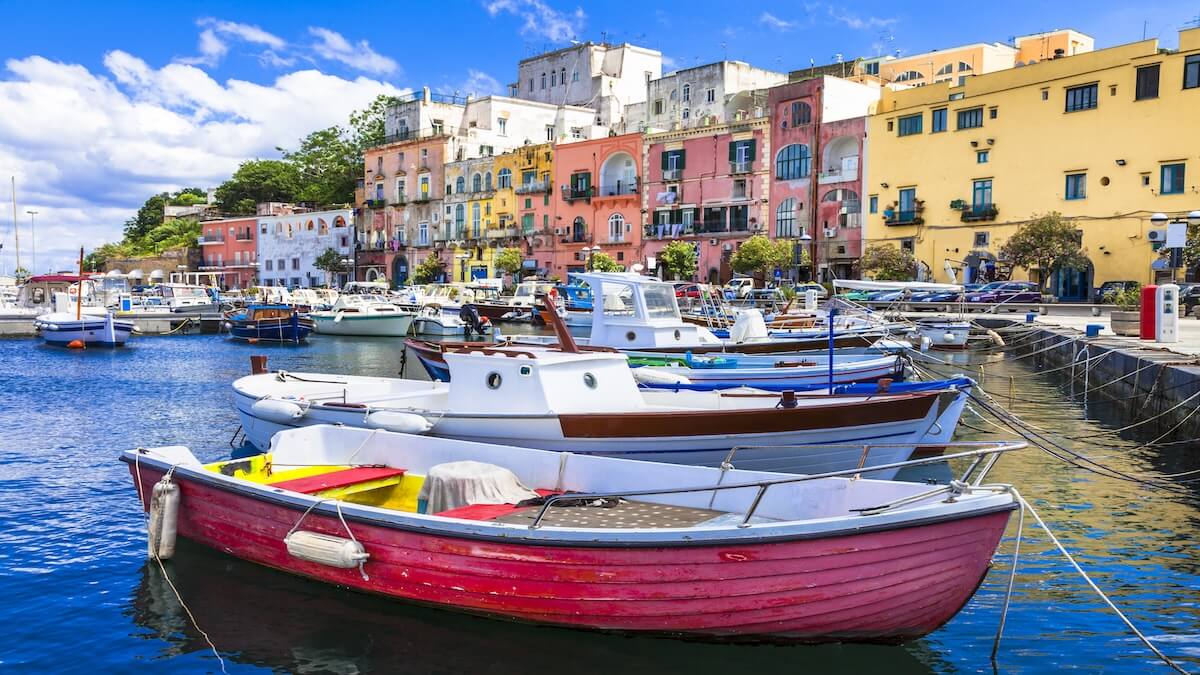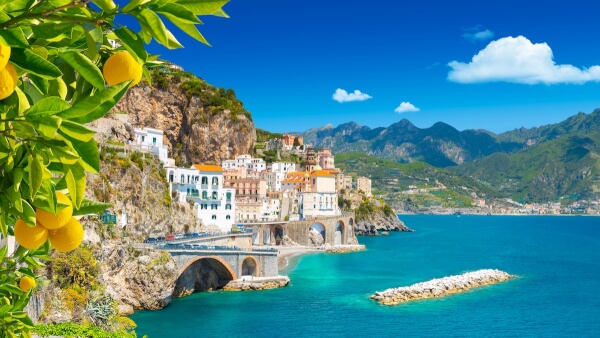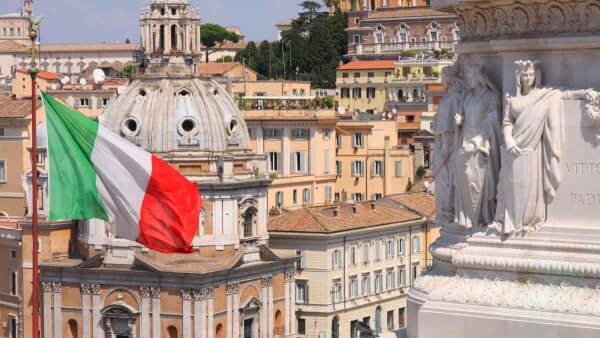Getting the Elective Residency Visa in Italy: A US citizen’s guide
Thinking about moving to Italy? This article will tell you everything you need to know about getting an Elective Residency Visa in Italy as an American.

Italy has a rich history, world-class cuisine, and beautiful landscapes, so it's no wonder that many Americans are considering moving to Italy from the USA. Each year, many US citizens make the leap to live in the country that gave us pasta and Renaissance art, but there are quite a few things to consider.
To have a successful move, it's essential to understand visa requirements, budget for the cost of living, learn what to expect from the healthcare system, and choose the right location for your lifestyle. Here's everything you need to know.
We'll also introduce Wise — your international money transfer alternative. Use Wise to send stress-free transfers to over 140 countries - all at the standard mid-market exchange rate.
| Table of contents |
|---|
Before diving into the practical details of your Italian adventure, here are a few important facts that'll help you understand what to expect as an American expat.
| Capital | Rome |
|---|---|
| Language | Italian |
| Population | 59.1 million¹ |
| Currency | Euro (EUR) |
| Government type | Parliamentary republic |
| Religion | Predominantly Catholic, with religious minorities |
| Weather | Mediterranean in the south, continental in the north |
| EU member | Yes (founding member) |
| Tax treaty | Yes² |
Americans can stay in Italy for 90 days without a visa, which is a great option for extended vacations or trying out life there for a few months.³
But if you want to make Italy your long-term home, you need to secure legal residency. Here are your options for Italian visas:
A work visa lets you live and work in Italy for 1 to 2 years, depending on your employment contract. You need a job offer from an Italian employer.⁴ Your employer will need to get work authorization (called nulla osta) for you from the immigration office.
To get your residence permit, you'll also need documents like a valid passport, proof of accommodation, proof of income, and health insurance. However, keep in mind that finding a good job in Italy isn't the easiest thing to do, and the salaries may seem low compared to the US.
Full-time students enrolled at Italian universities can get a student visa. You need proof of enrollment, financial support, and health insurance. The visa also allows you to work part-time up to 20 hours per week.⁴
After graduation, you can stay temporarily to look for employment and potentially transition to a work visa. However, this isn't guaranteed.
If you work remotely with clients outside Italy, you may qualify for the digital nomad visa. It lasts for 1 year, and then you can renew it for 2 more years.⁴ It's also sometimes called the investor visa.
You'll need to show proof of stable income, with the threshold of around 28,000 EUR per year, but the Italian government can adjust this number.⁴ If you want to bring your family members (such as your spouse and children), you can, but you'll need to show a higher income.
This residence visa requires a significant financial investment, but you get a direct path to residency. Your investment options are:
You get attractive tax benefits, visa-free travel to other European countries, and, after 10 years of residency, even a way to become an Italian citizen.
You can also bring your family with you on an Italian Golden Visa.
Many investors hire a company that specializes in Golden Visas to help them navigate the process, and these services come with additional fees.
Freelancers, consultants, and entrepreneurs can apply for this visa if they have sufficient funds to start their business in Italy. You need to meet professional requirements for your field, have accommodation lined up, and carry health insurance.
| The visa lasts 1 year and can be renewed, but it can also be tricky to get.⁴ |
|---|
The elective residence visa is great for retirees or anyone with passive income who wants to live in Italy without working. You need around 31,000 EUR per year for a single person or 38,000 EUR for married couples from sources like pensions, investments, or rental income.⁴
The visa lasts for 1 year, and you can renew it for up to 5 years total.⁴ You'll need proof of health insurance and accommodation in Italy, and you won't be able to work there. You must live off your passive income.
| 💡 Learn more about retiring in Italy. |
|---|
If you have Italian ancestors, you might already be eligible for Italian citizenship without needing a visa at all. Italy doesn't limit how many generations back you can go, so even your great-grandparent can count.
You'll need official documents proving your Italian lineage through birth certificates and other records, and processing can take up to 3 years.⁴ However, once you're an Italian citizen, you can easily move and live there, enjoying la dolce vita.
Marrying an Italian citizen opens a path to citizenship. If you live in Italy, you can apply after 2 years of marriage. If you live elsewhere, it takes 3 years.⁴
However, keep in mind that you'll have to pass an Italian language exam as part of the process.
Even in major cities, Italy offers a lower cost of living compared to most areas in the US. However, it's still not cheap to live there.
On average, a single person can expect to spend 1,041 USD on monthly expenses, excluding rent. For a family of 4, you'll need around 3,662 EUR per month, plus rent.⁵
Here's a closer look at what you can expect to spend:
| Expense | Approximate cost (USD)⁵ |
|---|---|
| Meal at an inexpensive restaurant | 18 USD |
| Meal for 2 people at a mid-range restaurant | 82 USD |
| Apartment (1 bedroom) in the city centre | 849 USD |
| Apartment (3 bedrooms) in the city centre | 1,470 USD |
| Basic utilities | 229 USD |
| Internet | 32 USD |
| Phone plan | 12 USD |
| International school (yearly for 1 child) | 10,636 USD |
| Toyota Corolla Sedan (or similar new car) | 34,516 USD |
Keep in mind that major cities like Rome and Milan command much higher prices than smaller towns and southern regions. If you're looking for more affordable living, consider moving to a city like Palermo, Lecce, or Bari.
Opening an Italian bank account will make your daily life much easier, so it's something you should consider if you want to live there long-term. It'll be handy for paying your bills and daily expenses.
Most major Italian banks like UniCredit, Intesa Sanpaolo, and BNL accept American customers. You'll typically need your passport, Italian tax code (codice fiscale), proof of Italian address, evidence of income or employment, and other documents that the bank may request.
However, the paperwork can be slow.
Be patient with the process and don't expect things to work the way they do in the US. Italians take their work/life balance seriously, so sometimes things take longer than expected.
As an American living in Italy, you're often on the hook for both American and Italian taxes.
The US taxes its citizens even if they don't live in America anymore. This means you must file US tax returns even after you move to Italy.
If you spend more than 183 days in Italy or become an official resident, Italy considers you a tax resident and requires you to pay taxes on your worldwide income. Italian income tax rates range from 23% to 43%, plus regional and municipal taxes that can add another 1% to 4%.⁴
However, the good news is that there's a US-Italy tax treaty that helps prevent double taxation, which is having to pay taxes in both countries on the same income. Laws like the Foreign Earned Income Exclusion (FEIE) and Foreign Tax Credit (FTC) help you reduce your tax liability in the US.
However, you still need to file your tax return every year, even if you manage to claim exceptions on all of your income. Consider hiring a tax professional who can help you navigate both countries' requirements.
It's a good idea to start with temporary housing to explore different neighborhoods and understand what you really want in Italy. A short-term option like Airbnb can work great for your first few weeks or even months if you're still not sure where you want to live.
Once you're ready for renting long-term in Italy, these websites can help you find apartments or houses:
Beyond online searches, consider asking locals, checking university bulletin boards (especially in student cities), and walking through neighborhoods you like. Many rentals are advertised with simple signs in the windows.
After living in Italy for a while, you might consider buying property. Americans can purchase Italian real estate without restrictions, but it might be hard to get a mortgage as a foreigner.
Italy's national healthcare system, called Servizio Sanitario Nazionale (SSN), provides basic healthcare services for free. The World Health Organization recognizes it as one of the world's best healthcare systems, but you need to be a legal Italian resident to use it.
If you have a proper visa, you can register with the SSN and receive a health card. This will cover your doctor visits, hospital stays, and prescription medications.
However, if your residence status isn't clearly established or you're still in the process of obtaining proper documentation, you must have private health insurance. Many visa applications actually require proof of private insurance coverage before approval.
Rome is popular with Americans and expats from all over the world. It's an ancient city with modern life, many museums, and endless entertainment options. Housing costs are high in central areas like Trastevere and Campo de' Fiori, but more affordable neighborhoods like Pigneto and San Lorenzo offer authentic Roman living. Many multinational companies have their offices here.
Italy's economic powerhouse attracts expats in finance, fashion, technology, and business consulting. Milan has some of the highest salaries in Italy, but living costs can also be steep. There are many internationally-minded neighborhoods, famous restaurants, and international schools.
Milan is also close to Switzerland, which makes it a great place if you want to travel to other European Union countries.
Bologna is home to a prestigious university, and its cost of living is lower than in bigger cities like Rome and Milan. The local community is welcoming to internationals, and the city's central location makes weekend trips throughout Italy easy. You'll also find a lively nightlife and cultural scene, thanks to the many students in the area.
Florence appeals to many American expats who love art. Housing costs are moderate compared to Rome and Milan, with beautiful apartments available both in the historic center and the surrounding hills.
There are also a few international universities and study abroad programs, so expect a pretty big English-speaking student community.
Naples is a southern city with a significantly lower cost of living compared to northern cities like Milan. The expat community is smaller, but you'll find some retirees, remote workers, and those seeking an alternative Italian experience. The food is exceptional, and the weather is warm year-round.
However, job opportunities are more limited, so it's better suited for working remotely or living on an independent income.
Living in Italy is typically safer than in many US cities.
The main safety concerns are petty crimes like pickpocketing, especially in tourist areas of Rome, Milan, Florence, and Naples. These crimes target valuables, not people, and rarely involve violence.
To stay safe, use common-sense precautions like keeping your valuables secure and staying aware of your surroundings in crowded areas. Like everywhere in the world, some neighborhoods have higher crime rates, but these areas are usually obvious and easily avoided.
Italy can be an amazing place to live as an American if you're looking for a slower pace of life, a rich culture, and excellent food. However, the cost of living can be high in major cities like Milan and Rome, and you'll need a proper visa to stay in Italy permanently.
| Wise can help you get a better deal on currency conversion. You can convert over 40 currencies at the standard mid-market exchange rate, and we'll show you the fees upfront so you know exactly how much you're paying. |
|---|
Get a Wise Account
in minutes 💰
Sources
Sources checked 09/23/2025
*Please see terms of use and product availability for your region or visit Wise fees and pricing for the most up to date pricing and fee information.
This publication is provided for general information purposes and does not constitute legal, tax or other professional advice from Wise Payments Limited or its subsidiaries and its affiliates, and it is not intended as a substitute for obtaining advice from a financial advisor or any other professional.
We make no representations, warranties or guarantees, whether expressed or implied, that the content in the publication is accurate, complete or up to date.

Thinking about moving to Italy? This article will tell you everything you need to know about getting an Elective Residency Visa in Italy as an American.

If you're a US expat in Italy, check out this guide to know whether you're subject to Italian taxes and how to fulfill your US reporting obligations.

Everything you need to know about getting a Golden Visa in Italy.

Thinking about moving to Italy? Find out what you need to know about renting in Italy in this guide.

Get ready for la dolce vita with our guide on retiring in Italy.

Looking for jobs in Italy? Find all you need to know about Italian work visa requirements.